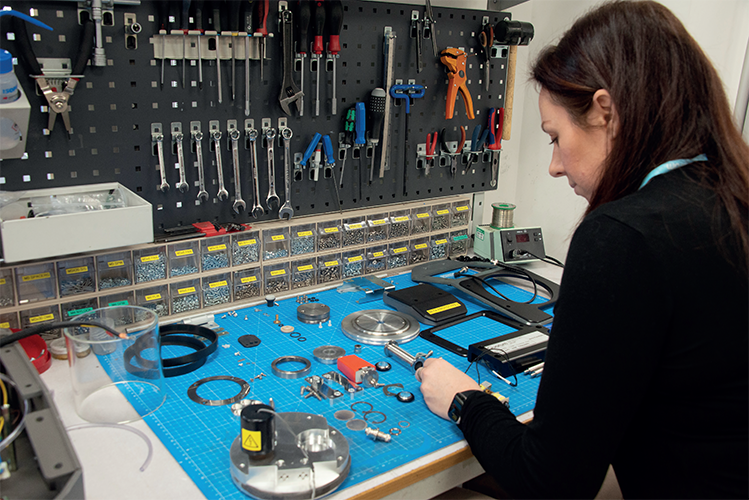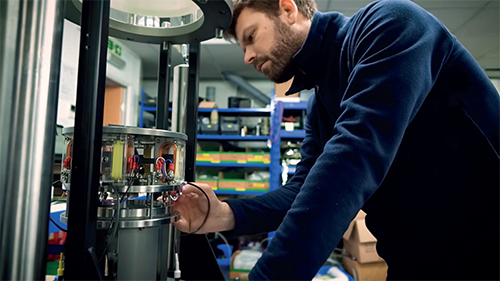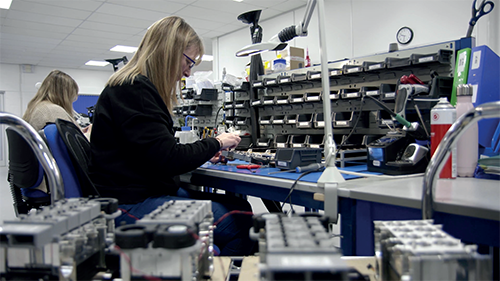
Judges Scientif ic plc
A Group of Independently minded but Cooperative businesses
As an AIM-listed company, Judges Scientific plc is a group focused on the Scientific Instrument sector, growing through acquisition and organically: a ‘buy and build’ strategy
Judges Scientific plc (Judges) was established by David Cicurel in 2003 to gradually attract businesses in the scientific instrument sector. Through 19 acquisitions since then, he has created a group of companies that are all UK-headquartered, but which export an impressive 85 percent of their products, with large proportions of their sales going to the USA, the EU and China/Asia. Their end-user markets are predominantly research and measurement based, a mix of large and small industrial companies, universities, or government and regulatory authorities worldwide. “The group has established a strong reputation for honorably buying good businesses in the sector, and helping and encouraging them to grow across the medium-to-long-term,” says Mark Lavelle, Judges’ Chief Operating Officer. “The focus is very much on buying quality businesses that are in sub-sectors with long-term growth potential; we have bought an average of one business a year, but if we find three good businesses in a year we will happily buy them – and if we can’t find any in a year we won’t drop our standards just to add one for the sake of it,” he says. “The companies we buy are all market leaders who have already proved they can perform, so the last thing we would do is to rebrand them or make big changes to their team; we want them to keep their identity and their passion for what they do. Each managing director is very much encouraged to continue to develop and evolve their own culture within the business, and to keep learning, innovating and growing.”
The first company Judges acquired was Fire Testing Technology Ltd based in East Grinstead, whose instruments do “just what it says on the tin!”. Its worldwide customer base (product manufacturers or testing laboratories) need to measure the flammability and the combustion gases emanating from product fires against regulatory standards.
In the construction-related space, some of the Judges companies test the performance of fiber optic cables (a market with plenty of opportunities as telecoms and the internet becomes an ever-larger part of our lives) and the stability of soil and rock (mostly driven by the civil engineering/infrastructure market). In pure science, some of the businesses make high performance cooling and tensile testing accessories for electro-microscopes, accessories for X-Ray Crystallography systems, nano-coating systems, and even accessories for particle accelerators, such as CERN or the Diamond Light Source at Harwell, UK. In life-sciences, Judges companies make instruments that measure activity in brain cells (particularly related to research into Alzheimer’s and Dementia), and biological illumination systems. Perhaps one of its most specialized businesses measures the strength of human hair – an unusual, but important test used by cosmetics companies worldwide to assess the effectiveness of their shampoos and conditioners! The most recent acquisition measures the thermal performance of lithium batteries – a critical and growing issue as IT, and particularly car batteries seek to become ever more powerful, compact and fast-charging.
Mark says that the group does not seek to impose a dogmatic ‘one size fits all’ ideology or methodology on the businesses, as many of the more traditional large aggressive/integrative international groups do. Rather, he says that the group works closely with each of its businesses to help them achieve solutions tailored for their individual markets and challenges. “The desire to change and innovate, then the determination to make it happen, has to come from within the businesses themselves, if it is ever to work. It is very important to us that we encourage our group to create this innovative culture,” he says.
Importantly all the Judges businesses are ‘complete businesses’ each with their own individual R&D, production and sales functions developing and manufacturing the majority of their products themselves, and selling them worldwide through a mix of direct sales and distributors/agents. Though keeping each business separate and entrepreneurial, and shunning the popular ‘synergy’ fads, the company does promote the sharing of best practice, through voluntary collaboration across the group. “We believe in letting our businesses focus on their specific niche, which means that they can respond much faster to market change, without having to refer small approval requests up through layers of uncomprehending bureaucracy. It is this local delegation, control and empowerment that is key to us. But good ideas from anyone deserve to be shared by all.
“However, the challenge with having a group as large as ours is that each business has its own personality, and some have greater requirements than others. But if we are going to leave them relatively independent, they have to be allowed to make some of their own mistakes and learn from them, because upholding that independence is critical,” Mark shares.
The company itself encourages a culture of transparency, which, according to Mark, is crucial to ensuring that its operation runs successfully. “There is an underlying culture of honesty and ethics, inspired by David Cicurel, that flows throughout the group, and everyone gets the sense that they should do the right thing, rather than cut corners. We avoid situations where people feel unreasonably pressured and therefore make inappropriate decisions; we are not in competition with each other.”
 With that, Mark is proud to discuss how well the company performed during the pandemic. “Some businesses were affected a little worse than others, but many did really well. I think what stood out for me was how local empowerment had a huge impact on the businesses, in that they took the initiative to implement measures that best suited their local situation, rather than wait for instructions to arrive from head office on how to handle the minutiae of the pandemic.
With that, Mark is proud to discuss how well the company performed during the pandemic. “Some businesses were affected a little worse than others, but many did really well. I think what stood out for me was how local empowerment had a huge impact on the businesses, in that they took the initiative to implement measures that best suited their local situation, rather than wait for instructions to arrive from head office on how to handle the minutiae of the pandemic.
“For example, we had one business that had recently moved to accommodate their recent growth and, by chance, had separate access points to the ground (production) and upper (office) floors. Therefore, they had an inbuilt flow system separating the office from production, which meant that throughout the pandemic, they had a great environment that allowed everyone to operate safely, continuously and largely unchanged. Compare that to another where conditions were pretty cramped with just a single access: they innovatively moved onto shift work in order to ensure that social distancing could be achieved. Every business had a different staff situation, a different physical layout, and different customer demands, and they knew they could just get on with the appropriate action. So, within two or three days of the first lockdown being announced, every business had a plan that they had implemented without referring to head office. But they were all also keen to be open and keep learning – any new Covid ideas/initiatives were quickly shared around the group and many people adjusted their plans based on good ideas they heard from their peers,” he expresses.
As the turbulent climate initiated by the pandemic begins to settle, Mark is eager to continue encouraging a culture of communication within the group for 2022, in order to ensure that each business is ready for whatever challenges lie ahead. “For the group to remain successful, it is vital that we maintain the vigorous ambition and independence values across the companies, while ensuring that we are also sharing any learning experiences with the wider group. We want our companies to talk to each other, and for key individuals with similar responsibilities at each business to get together and exchange information regularly so that we can keep challenging each other to raise the bar in every area.”
As he turns his focus to the future, Mark brings our discussion to a close by highlighting the importance of continually encouraging its businesses to look at their markets and grow where possible. “We will then invest accordingly, be innovative and as a group, we will encourage our companies to strive for their best. Of course, we also want to add other businesses that are excelling in their sectors to the group as and when we can, but that will only be when good new companies become available.”
As Judges continues to plan for long-term growth for its companies, Mark concludes that it is also determined to urge the current businesses to continue to lead and take-forward their respective sectors, and he looks forward to encouraging the continual learning, cooperation and innovation needed to achieve that.
Judges Scientific plc
https://www.judges.uk.com/
Services: Scientific Instruments